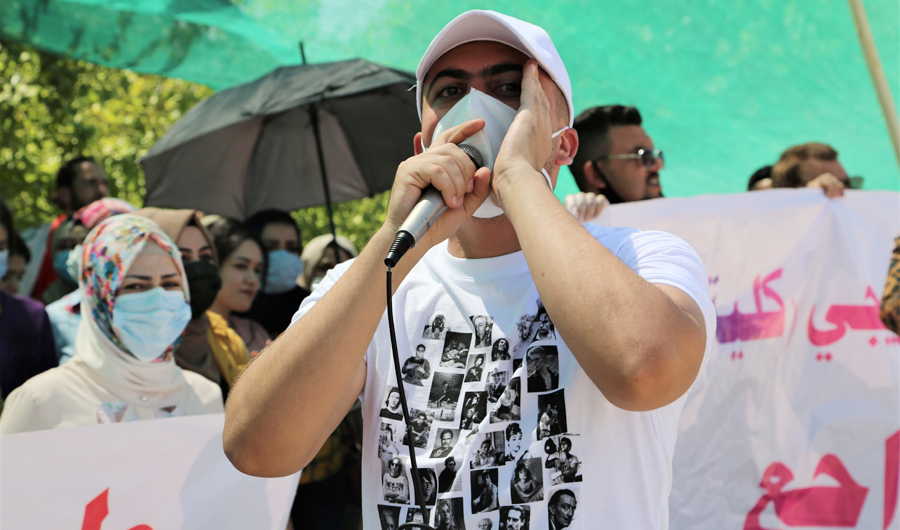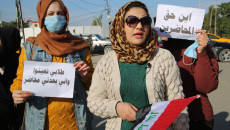Over 30,000 graduates and postgraduates in Kirkuk province have filled out applications for 1,000 job opportunities, which are scheduled to be employed on a contract basis for three years only with a monthly salary of 300,000 dinars (USD200), within the framework of the emergency security law.
The process which is being overseen by acting Kirkuk governor Rakan Saeed has drawn criticism.
The recruitment process of the 1,000 people is currently in the stage of separating the forms and consists of a number of conditions and guidelines, but the conditions are constantly changing, due to protests from different communities, which has pushed the Iraqi government to suspend the process.
One of the conditions mentioned in the application form, it requires the place of birth and also issuance of citizenship and civil status identification of applicants, for which you have 14 provinces, excluding the Kurdistan Region of Iraq KRI, while most Kurds expelled from Kirkuk were born and have issued identification cards in the KRI provinces.
Sabah Habib, a member of the Patriotic Union of Kurdistan PUK faction in the Iraqi parliament who monitors the recruitment process, stressed that this was a problem in the form and "they have tried a lot" to sort it out. "Now, the Kurdish provinces have been added.”
The provinces of the Kurdistan Region have now been added to the form
The guildlines state that 10% of the employment opportunities will be for the relatives of martyrs (martyrs of war against terrorism from the Iraqi army and the Popular Mobilization Forces PMF (Hashdi Shaabi), but the relatives of Peshmerga martyrs were not mentioned.
Chia Nazim, one of the graduates in Kirkuk, said, “My brother was martyred in the fight against Daesh (ISIS). According to the application form, we have no privilege while my brother also has defended this land.”
The Kirkuk Directorate of Martyrs and Anfal Victims of the Kurdistan Regional Government (KRG) has been able to solve the problem, according to Khalil Rahim, director of the office.
"Initially, the relatives of the Peshmerga martyrs were not given points in the 2019 recruitment, but later we solved this and they benefited," he told Kirkuk Now.
Religion, ethnicity and sect are separated in the form and the options include Christians, Yazidis, Shabaks, Sabi'as, Mandais and Failis, but the Kaka’is are concerned since they were not referred to in the application form.
“We believe that not specifying the identity of the Kaka’is in the form is unfair. There are many Kaka’i graduates who want to benefit according to their religion,” said Jawanro Ismail, a Kaka’i graduate of Kirkuk University.
Hemin Hasib, a lawyer in Kirkuk, said the Kaka’is have a long history in Kirkuk and they have been “oppressed,” but the form does not mention their religion.
The Iraqi constitution does not officially recognize the Kaka’i religion, unlike the Shabaks, Yazidis and Christians. However, according to a member of the committee, the Kaka’is are not deprived of this employment and can register themselves as Kurds.
The International Labor Organization ILO said unemployment rate in Iraq has jumped from 9% early 1990s into 13% in 2020.
Out of 40 million Iraqis, 9.2 million are employed while Iraq's state-dominated economy is led by the oil sector, which provides approximately 85% of state revenue. The government pays 400% more in salaries than it did 15 years ago. Around three quarters of the state’s expenditures in 2020 went to paying civil servants of the public sector.
The burden of state employees has pushed the Iraqi government to halt employment, a step which piled hundreds of thousands of graduates and post graduates over the last few years.
Kirkuk and many provinces of Iraq regularly witnesses demonstrations and protests by postgraduates asking for state employment.
Five years ago, Iraqi parliament has endorsed laws number 59 and 67 to employ the top gradates and post graduates, a light at the end of long tunnel, as the private sector is tumbling due to corruption and dominance of militia over rule of law and state.
According to KirkukNow, the main communities in the city have agreed to distribute 32% of the 1,000 jobs among Arabs, Kurds and Turkmen and the other four percent for the Christians, though this division has no legal or constitutional basis.
Dylan Ghafoor, a member of the Iraqi parliament, said on her Facebook account on September 12 that the Iraqi Ministry of Finance had suspended the recruitment process in Kirkuk on August 23, without giving any reason.
"The recruitment should not be suspended and we will inform the Council of Ministers," Dylan said.
The recruitment should not be suspended and we will inform the Council of Ministers
The decision comes at a time when a member of the committee to recruit the 1,000 people stressed that they are currently separating the 30,000 forms.
The employment will be for three years and a contract of 300,000 dinars, within the framework of the food security law passed by the Iraqi parliament this year.
So far, several changes have been made in the members of the committee, one of which was the resignation of the chairman of the committee, replaced by the acting governor of Kirkuk, Rakan Al-Jibouri.
Emad Daham, chairman of the governor's advisory board and chairman of the employment committee, cited "personal pressure and political pressure" as the reason for his resignation last month, saying he was pressed for shares in employment without elaboration.
"I have resigned, but the work of the committee continues. It is expected that the people who will be appointed will be transferred from one institution to another every six months for training," Daham told KirkukNow.
Omar Mustafa, director of citizens' affairs in the Kirkuk provincial office, a Kurd, said, the Kurds proposed that 32% of the recruits should be for each of the ethnic groups of Kirkuk, Turkmens have agreed, followed by the Arabs.
Kirkuk, Iraq’s second largest reserves, located 238 kilometers north of Baghdad, is an ethnically mixed province for 1.7 million Arabs, Kurds and Turkmens. It has long been at the center of disputes between Baghdad and the Erbil.
Mustafa few days ago was removed from the committee by the acting governor of Kirkuk and replaced by another Kurd. "I don't know the reason for my removal," he said.
"We have submitted the division plan to the Ministry of Finance, but we have not received a response yet and we are waiting for an answer, but the committee is doing its job," he added.






